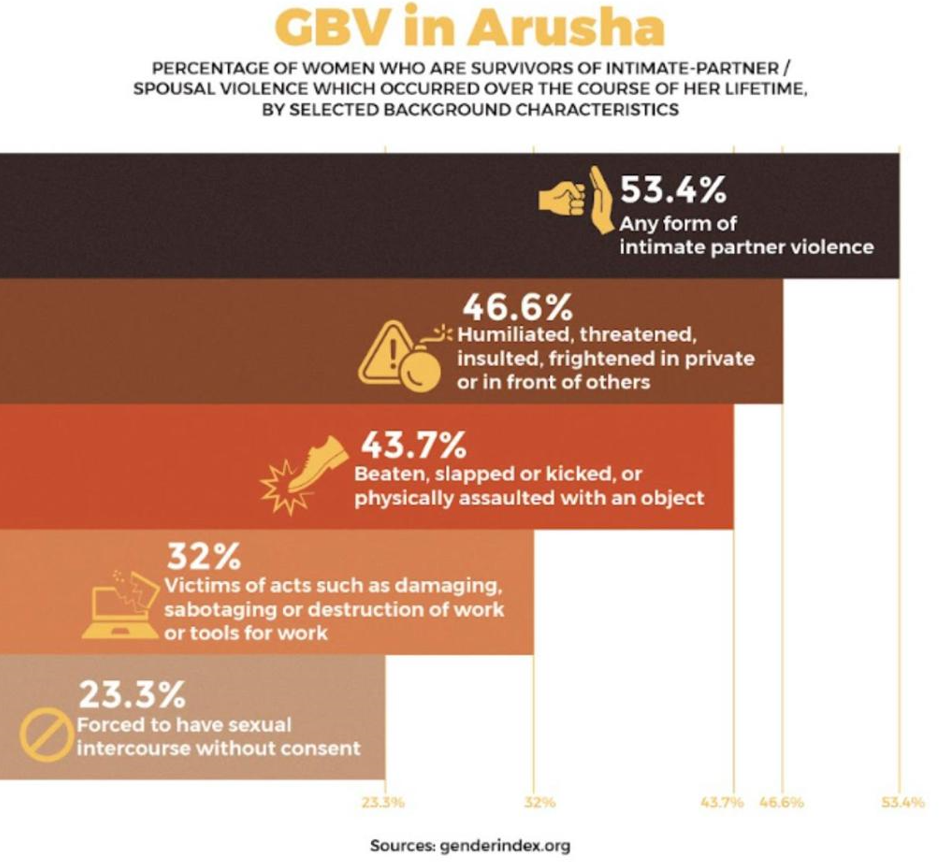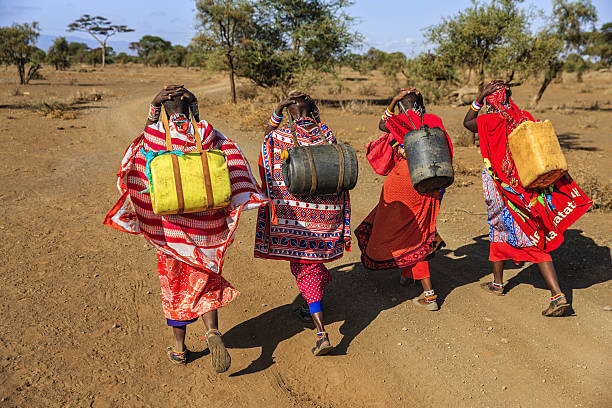Arusha. Before drought hits Lumbwa Village in Longido District, Arusha Region, life for the 23-year-old Naishoki Palagiki was okay. No problem at all. But after three years her life changed completely as cattle they were depending on died due to absence of pasture and water due to prolonged drought that hardly hit the entire northern part of Tanzania.
At that time, the mother of three started to experience beatings from her husband as she used to take a few remaining cattle far away looking for pasture and water and came home late .
Life for the spouses became sour as Naishoki’s husband accused her of going far away to meet with her lovers, something that wasn’t the case.
In August 2022, after 15 cattle died due to the effects of prolonged drought, Naishoki’s husband abandoned the family. Her husband was the sole breadwinner. He also disappeared in search of basic needs in urban centers, where also life was miserable and he couldn’t maximize his dreams of bringing something home.
“At that time, I was spending the whole day looking for pasture for the remaining animals and I was getting little, with some animals dying on the way,” she narrates, noting that she was forced to take care of her children alone, something she can’t afford without aid.
Naishoki is among women in northern Tanzania who have experienced increasing abuse from their husbands due to prolonged drought. The drier it gets, the more time they spend looking for water and pasture, and the more violence they face at home.
Arusha Regional Administration Secretary (RAS) Missaile Musa once said that by December 10, 2022 up to 4,705 incidents of violence and sexual violence were reported, of which 4,013 incidents affected women and girls, while 692 related to men and boys.
The 36-year-old Neema Saitabau has a story similar to Naishoki’s. She walks long distances to find water for drinking and other domestic uses, and when she is late to get home and cook for her family, her husband assaults her.
“My husband beat me three times due to being late in returning home after searching for water. The journey is long, so if I leave at seven in the morning, I come back at five to find the children and husband nearly starving. That is the reason for the beating,” said Neema.
Neema said that the search for water not only exposes women to violence at home, but also rape, especially when they seek water in the springs located nearly 12 kilometres away, near the irrigated agricultural fields of Ngarenanyuki and Ngabobo.
“My daughter has survived being raped twice by young men who water tomatoes in the field, when looking for water. Drought has caused water to become a problem for us,” she explained, her face twitching.
According to a report by the United Nations Intergovernmental Panel on Climate Change (IPCC), global warming above 1.5ºC triggers an increase in natural disasters and subsequent devastation in communities around the world.
Moreover, the effects lead to a higher risk of gender-based violence due to increased stress in communities, leading to patriarchal practices such as child marriage and intimate partner violence.
Such was the case for 42-year-old Nasupati Lomnyaki of Matadi village in Siha District, Kilimanjaro Region whose daughter dropped out of school last year due to pregnancy that she was being impregnated by her brother-in-law.
According to Nasupati, the man lured her daughter that she would be cured of nose bleeding if she did sexual intercourse with him and the young lady agreed because she hadn’t any option as the disease often worsened during hot weather. But, instead of being cured, the girl end-up getting pregnant.

Simel ole Kitasho, Maasai traditional leader in Siha and Longido districts, said that for the past ten years, drought has affected many Maasai households, and many have lost their herds and livelihoods.
According to Ole Kitasho, between 2020 and 2022 herders in Arusha and Manyara regions lost 1,874 cows due to the drought that touched off widespread loss of pasture and water.
Joseph Mabiti, Siha District Administrative Secretary (DAS) said that for the entire decade, many Maasai men abandoned their families and fled to urban centers and cities where they engage in petty businesses, which have nothing to contribute to their families.
The burden of taking care of families has left in the hands of poor women and children, Mabiti said.
The DAS is of the view that climate change left Maasai women in hardships, which can be equated to GBV in that sense.
The Tanzania GBV Assessment by the World Bank found that 40 per cent of women aged 15-49 years have experienced physical violence, 17 per cent have experienced sexual violence, and 44 per cent have experienced either physical or sexual violence by an intimate partner. Morever, nearly one in three girls experience sexual violence before the age of 18.
Spousal violence prevalence is highest in rural areas, averaging 52 per cent while the prevalence in urban areas averages 45 per cent.
Consolatha Kinabo, the coordinator for ‘Promoting Equality for Human Rights Education’ at TUSONGE Community Development Organization (CDO) that provides gender awareness education in peripheral areas of the two regions, said that despite the great work being done to break down stereotypes and to criticise violent actions, more effort is needed to stem increases in violent incidents.
Kinabo said TUSONGE has recommended that village and ward authorities provide legal education and explain effects of sexual violence on women and children. The organisation has also recommended a review of traditions such as polygamy, child marriage and female genital mutilation that promote gender-based violence.
“To mitigate the effects of climate change that trigger drought and violence,” says Noel Kikware, the Environmental Officer for the National Environment Management Council (NEMC) in the northern zone.
He says the council is extending environmental education to the community focusing on areas most affected by the drought conditions.
Some of the lessons they provide are how to preserve rain water for future use and keeping sustainable herds.
“Spreading education to young people and others in drought-prone areas is a helpful tool in conveying the message to the entire community of residents of the northern regions of Kilimanjaro, Arusha, Manyara and Tanga. The environmental agenda is for everyone. You can see for yourself that the temperature has increased rapidly and caused drought.”
“The northern regions have witnessed water sources drying up. There is no feed for livestock and economic activities have declined, while women and children are victims of sexual violence in the search for water or pasture in the surrounding areas, day and night,” he explained.
The World Wildlife Fund (WWF) is also implementing a climate change project that invests in water infrastructure to reduce the interaction between humans and animals.
Novat Kessy, WWF project manager says that the project builds communities’ ability to deal with climate change. With the dams, water can be stored for use during drought and save the herders and farmers from walking long distances.
This article was produced as part of the Aftershocks Data Fellowship (22-23) with support from the Africa Women’s Journalism Project (AWJP) in partnership with The ONE Campaign and the International Center for Journalists (ICFJ).



Your point of view caught my eye and was very interesting. Thanks. I have a question for you.
Heya i’m for the primary time here. I came across this board and I find It truly helpful& it helped me out much. I hope to give something again and aid others suchas you helped me.
uw8d5s
k2jzx6